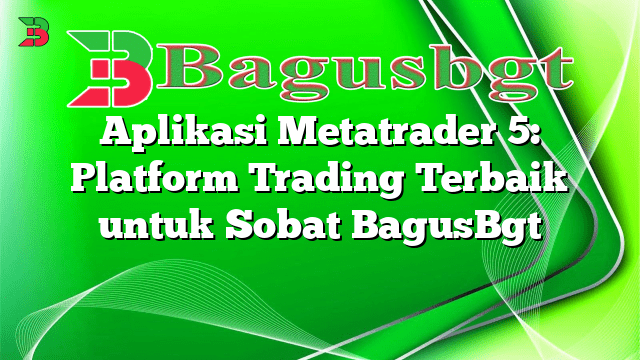Hello, dear readers. In this article, we will delve into the definition of forex trading, its advantages and disadvantages, and provide you with a detailed understanding of this popular financial market.
1. What is Forex Trading?
Forex trading, also known as foreign exchange trading, is the process of buying and selling currencies on the foreign exchange market. It involves the simultaneous buying of one currency and selling of another, with the aim of profiting from the fluctuations in exchange rates.
2. How Does Forex Trading Work?
The forex market operates 24 hours a day, five days a week. It is a decentralized market where participants, such as banks, financial institutions, corporations, and individual traders, trade currencies. Trading is conducted through electronic platforms or over-the-counter (OTC) transactions.
3. Advantages of Forex Trading
Forex trading offers several advantages, including:
- Liquidity: With a daily trading volume surpassing $6 trillion, the forex market is highly liquid. Traders can easily enter and exit positions without significant price fluctuations.
- Flexibility: Forex trading allows traders to choose their desired lot sizes, offering flexibility for both small and large investors.
- Profit Potential: The forex market’s volatility presents numerous opportunities for traders to profit from price movements.
- Accessibility: The forex market is accessible to traders worldwide, offering equal opportunities regardless of location.
4. Disadvantages of Forex Trading
While forex trading has its advantages, it also comes with certain disadvantages, such as:
- Risk: Forex trading involves significant risk, and traders may incur substantial losses if not properly managed.
- Complexity: Understanding the factors influencing currency movements and analyzing market trends requires in-depth knowledge and experience.
- Highly Volatile: The forex market can be highly volatile, leading to sudden price fluctuations and increased risk.
- Leverage: The use of leverage in forex trading can amplify both profits and losses, making it a double-edged sword.
5. Alternative Definitions of Forex Trading
Forex trading can be defined as currency trading, FX trading, or foreign currency trading. It involves speculating on the price movements of different currencies to make a profit.
6. Forex Trading Table
| Term | Definition |
|---|---|
| Pip | The smallest unit of measure in forex trading, representing the change in the exchange rate for a currency pair. |
| Leverage | The use of borrowed funds from a broker to increase the potential return of an investment. |
| Lot | A standardized trading unit representing a certain amount of a currency. |
| Spread | The difference between the bid and ask price of a currency pair, representing the cost of the trade. |
7. Frequently Asked Questions (FAQ)
Q: Can I trade forex with a small investment?
A: Yes, forex trading allows traders to start with small investments. However, it is important to manage risk and use proper money management techniques.
Q: How can I learn forex trading?
A: There are various educational resources available, including online courses, webinars, and books, that can help beginners learn forex trading.
Q: Is forex trading suitable for everyone?
A: Forex trading is not suitable for everyone. It requires time, dedication, and a willingness to learn. It is essential to assess your risk tolerance and financial goals before engaging in forex trading.
Conclusion
In conclusion, forex trading is the buying and selling of currencies on the foreign exchange market. It offers numerous advantages, such as liquidity and flexibility, but also comes with risks, including volatility and leverage. Understanding the definition of forex trading and its intricacies is crucial for individuals looking to participate in this dynamic market.
 Bagus Banget Kumpulan Informasi terbaru dari berbagai sumber yang terpercaya
Bagus Banget Kumpulan Informasi terbaru dari berbagai sumber yang terpercaya




